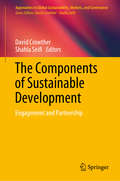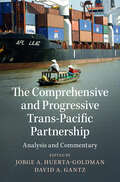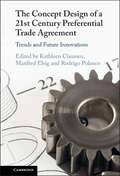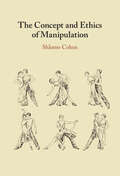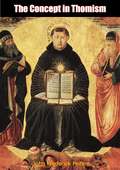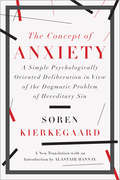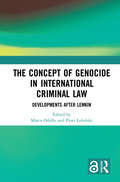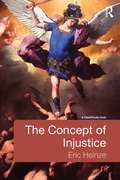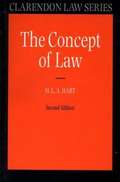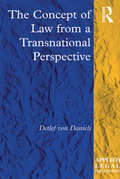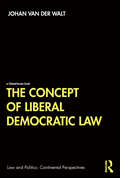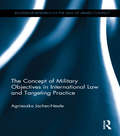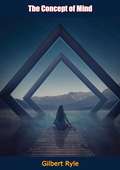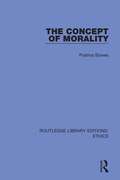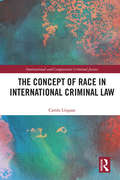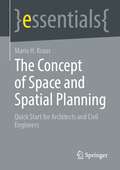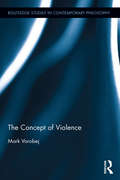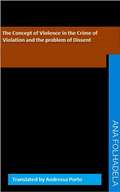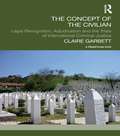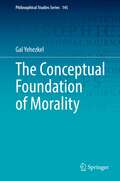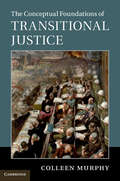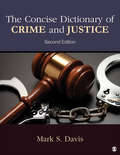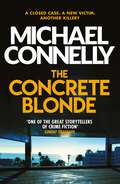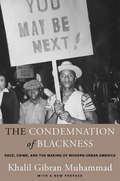- Table View
- List View
The Components of Sustainable Development: Engagement and Partnership (Approaches to Global Sustainability, Markets, and Governance)
by David Crowther Shahla SeifiThis book focuses on the application of sustainable development principles through consultation with, and partnerships between commerce and the community. Offering international perspectives, the authors show that the issues are global and that we can best arrive at solutions through a synthesis of these various perspectives. The book also examines changes to corporate and institutional behavior and discusses the extent to which the focus has changed, making it necessary to consider new approaches to our understanding of sustainability and differing effects in practice.This approach is based on the tradition of the Social Responsibility Research Network, which in its 17-year history has sought to broaden the discourse and to treat all research as inter-related and relevant to business. This book consists of the best contributions from the 17th International Conference on Corporate Social Responsibility and 8th Organisational Governance Conference, held in Bangalore, India in September 2018
The Comprehensive and Progressive Trans-Pacific Partnership: Analysis and Commentary
by David A. Gantz Huerta-Goldman, Jorge A.The Comprehensive and Progressive Agreement for Trans-Pacific Partnership among eleven key nations of the Pacific Rim has already expanded trade and economic cooperation among the Parties. It also serves to encourage political cooperation among them and has served as a model for future 'wide and deep' free trade agreements. The chapters of this book will provide readers with a detailed understanding of the CPTPP's coverage, including provisions relating to tariff elimination, customs rules of origin, agriculture, sanitary and phytosanitary measures, technical barriers to trade, telecommunications, intellectual property, investment and investor–state arbitration, financial and other services, government procurement, state-owned enterprises, electronic commerce and digital trade, small and medium-sized enterprises, competition law, labor and environmental protection, dispute settlement, and many others. No international lawyer, economist, trade negotiator, or enterprise can afford not to take advantage of the opportunities for business that the CPTPP offers. This book has been written by CPTPP negotiators, experts, and practitioners.
The Concept Design of a Twenty-First Century Preferential Trade Agreement: Trends and Future Innovations
by Manfred Elsig Rodrigo Polanco Kathleen ClaussenThe Concept Design of a 21st Century Preferential Trade Agreement describes the current status and possible future evolution of trade agreements. The individual contributions provide fine-grained analyses of the various challenges trade agreements face and how these differ across countries. The book brings together leading researchers from international law and international relations to provide conceptual and empirical insights to inform the ongoing reform debates. By taking stock of scholarly advances, the book further aims at stimulating cross-fertilization in the study of trade agreements in the field of international economic law. This title is also available as Open Access on Cambridge Core.
The Concept and Ethics of Manipulation
by Shlomo CohenEveryone is exposed to manipulation daily, and everyone manipulates too. The impact of manipulations in personal, social, and political life is enormous. Is this tragic? Is it avoidable? Is it always morally bad or regrettable? To answer these questions, we need a theory of manipulation. This book is the first comprehensive philosophical theory of manipulation. Shlomo Cohen offers a new theory on what manipulation is, distinguishing it from other kinds of influence, and assesses the basic moral status of manipulation. In contrast to prevailing views, he argues that manipulation, though often morally bad, is not inherently morally bad, and that alongside its dangers, it has a central role as a 'lubricant' of social frictions which helps to regulate social and political relations. His analysis offers a window to better understanding the ethics of the interplay of reason and power in human relations.
The Concept in Thomism
by John Frederick PeiferOf all the problems, or rather mysteries, with which philosophy deals, those concerned with the nature and objectivity of human knowledge hold a privileged position.In The Concept in Thomism this problem, stemming from Descartes, is clearly and forcefully stated. Thus, from the very beginning, the reader is made aware of the central difficulty faced by any theory of knowledge.The Cartesian and Kantian phases in the development of a satisfactory theory are briefly but adequately described. Then, John Peifer sets forth the reconciliation of both the immanence and transcendence of knowledge as explained by the realistic traditions originating with Aristotle and Thomas Aquinas.The differences between mere physical and psychic changes and the conditions required for knowing are explained in detail. The often misunderstood doctrine of the species, its nature and necessity, is wonderfully developed and shown to be a cognitional necessity.The most important part of this work, however, is concerned with the role of the concept in knowledge. The correct notion of the objective concept, so long neglected, is shown to be the key for a realistic philosophical doctrine. This study alone makes The Concept in Thomism a work of exceeding importance for future philosophers and thinkers.
The Concept of Anxiety: A Simple Psychologically Oriented Deliberation in View of the Dogmatic Problem of Hereditary Sin
by Alastair Hannay Soren KierkegaardThe first new translation of Kierkegaard's masterwork in a generation brings to vivid life this essential work of modern philosophy. Brilliantly synthesizing human insights with Christian dogma, Soren Kierkegaard presented, in 1844, The Concept of Anxiety as a landmark "psychological deliberation," suggesting that our only hope in overcoming anxiety was not through "powder and pills" but by embracing it with open arms. While Kierkegaard's Danish prose is surprisingly rich, previous translations--the most recent in 1980--have marginalized the work with alternately florid or slavishly wooden language. With a vibrancy never seen before in English, Alastair Hannay, the world's foremost Kierkegaard scholar, has finally re-created its natural rhythm, eager that this overlooked classic will be revivified as the seminal work of existentialism and moral psychology that it is. From The Concept of Anxiety: "And no Grand Inquisitor has such frightful torments in readiness as has anxiety, and no secret agent knows as cunningly how to attack the suspect in his weakest moment, or to make so seductive the trap in which he will be snared; and no discerning judge understands how to examine, yes, exanimate the accused as does anxiety, which never lets him go, not in diversion, not in noise, not at work, not by day, not by night."
The Concept of Genocide in International Criminal Law: Developments after Lemkin
by Marco OdelloThis book presents a review of historical and emerging legal issues that concern the interpretation of the international crime of genocide. The Polish legal expert Raphael Lemkin formulated the concept of genocide during the Nazi occupation of Europe, and it was then incorporated into the 1948 Convention on the Prevention and Punishment of the Crime of Genocide. This volume looks at the issues that are raised both by the existing international law definition of genocide and by the possible developments that continue to emerge under international criminal law. The authors consider how the concept of genocide might be used in different contexts, and see whether the definition in the 1948 convention may need some revision, also in the light of the original ideas that were expressed by Lemkin. The book focuses on specific themes that allow the reader to understand some of the problems related to the legal definition of genocide, in the context of historical and recent developments. As a valuable contribution to the debate on the significance, meaning and application of the crime of genocide the book will be essential reading for students and academics working in the areas of Legal History, International Criminal Law, Human Rights, and Genocide Studies.
The Concept of Injustice
by Eric HeinzeThe Concept of Injustice challenges traditional Western justice theory. Thinkers from Plato and Aristotle through to Kant, Hegel, Marx and Rawls have subordinated the idea of injustice to the idea of justice. Misled by the word’s etymology, political theorists have assumed injustice to be the sheer, logical opposite of justice. Heinze summons ancient and early modern texts, philosophical and literary, with special attention to Shakespeare, to argue that injustice is not primarily the negation, failure or absence of justice. It is the constant product of regimes and norms of justice. Justice is not always the cure for injustice, and is often its cause.
The Concept of Law (2nd Edition)
by H. L. A. HartH L A Hart's The Concept of Law is the classic text for the study of jurisprudence and legal philosophy and is probably the most important work of legal philosophy written this century. This second edition is particularly valuable as it combines Hart's original text with a postscript, in which he responds to criticisms of his theory levelled by such notable scholars as Dworkin, Fuller and Finnis. Written by him but only discovered after his death, it has been ably edited by JosephRaz and Penelope Bulloch of Balliol College, Oxford.
The Concept of Law from a Transnational Perspective (Applied Legal Philosophy)
by Detlef von DanielsThis book brings together the fruits of different traditions in legal philosophy and draws on them to develop a systematic thesis on the concept of law. The work uses a legal model to explore the underlying question of how the current phenomena of transnational law are best understood, in combination with an examination of the traditions of Jürgen Habermas's critical theory and H.L.A. Hart's analytic jurisprudence. This leads the author to conclude that the key to a fruitful dialogue and comprehensive understanding is to appreciate that the concept of law is not state-cantered and must reflect relationships to other legal systems.
The Concept of Liberal Democratic Law (Law and Politics)
by Johan van Der WaltThis book develops a historical concept of liberal democratic law through readings of the pivotal twentieth century legal theoretical positions articulated in the work of Herbert Hart, Ronald Dworkin, Duncan Kennedy, Rudolf Smend, Hans Kelsen and Carl Schmitt. It assesses the jurisprudential projects and positions of these theorists against the background of a long history of European metaphysics from which the modern concept of liberal democratic law emerged. Two key narratives are central to this history of European political and legal metaphysics. Both concern the historical development of the concept of nomos that emerged in early Greek legal and political thought. The first concerns the history of philosophical reflection on the epistemological and ontological status of legal concepts that runs from Plato to Hobbes (the realist-nominalist debate as it became known later). The second concerns the history of philosophical and political discourses on law, sovereignty and justice that starts with the nomos-physis debate in fifth century Athens and runs through medieval, modern and twentieth century conceptualisations of the relationship between law and power. Methodologically, the reading of the legal theoretical positions of Hart, Dworkin, Kennedy, Smend, Kelsen and Schmitt articulated in this book is presented as a distillation process that extracts the pure elements of liberal democratic law from the metaphysical narratives that not only cradled it, but also smothered and distorted its essential aspirations. Drawing together key insights from across the fields of jurisprudence and philosophy, this book offers an important and original re-articulation of the concept of democratic law.
The Concept of Military Objectives in International Law and Targeting Practice (Routledge Research in the Law of Armed Conflict)
by Agnieszka Jachec-NealeThe concept that certain objects and persons may be legitimately attacked during armed conflicts has been well recognised and developed through the history of warfare. This book explores the relationship between international law and targeting practice in determining whether an object is a lawful military target. By examining both the interpretation and its post-ratification application this book provides a comprehensive analysis of the definition of military objective adopted in 1977 Additional Protocol I to the four 1949 Geneva Conventions and its use in practice. Tackling topical issues such as the targeting of TV and radio stations or cyber targets, Agnieszka Jachec-Neale analyses the concept of military objective within the context of both modern military doctrine and the major coalition operations which have been undertaken since it was formally defined. This monograph will be of great interest to students and scholars of international law and the law of armed conflict, as well as security studies and international relations.
The Concept of Mind: 60th Anniversary Edition
by Gilbert RyleThe Concept of Mind is a 1949 book by the philosopher Gilbert Ryle, in which the author argues that "mind" is "a philosophical illusion hailing chiefly from René Descartes and sustained by logical errors and 'category mistakes' which have become habitual." The work has been cited as having "put the final nail in the coffin of Cartesian dualism" and has been seen as a founding document in the philosophy of mind, which received professional recognition as a distinct and important branch of philosophy only after 1950.—Print ed.
The Concept of Morality
by Pratima BowesIn this book, originally published in 1959, the author believes that general moral concepts embody conceptions of standards in accordance with which particular moral judgments proceed and these may become objects of theoretical understanding and knowledge – and hence be treated as facts in some context of a moral nature – in an ethical enquiry that is philosophical in character. The book clarifies the implications of conceptions which are used when aspects of our experiences are evaluated from a distinctive point of view, namely that of morality. It examines some of the theories which suggest that the function of ethical philosophy is something quite other than what traditional philosophers believed it to be, namely by asking what goodness or justice is.
The Concept of Race in International Criminal Law (International and Comparative Criminal Justice)
by Carola LingaasMembers of racial groups are protected under international law against genocide, persecution, and apartheid. But what is race – and why was this contentious term not discussed when drafting the Statute of the International Criminal Court? Although the law uses this term, is it legitimate to talk about race today, let alone convict anyone for committing a crime against a racial group? This book is the first comprehensive study of the concept of race in international criminal law. It explores the theoretical underpinnings for the crimes of genocide, apartheid, and persecution, and analyses all the relevant legal instruments, case law, and scholarship. It exposes how the international criminal tribunals have largely circumvented the topic of race, and how incoherent jurisprudence has resulted in inconsistent protection. The book provides important new interpretations of a problematic concept by subjecting it to a multifaceted and interdisciplinary analysis. The study argues that race in international criminal law should be constructed according to the perpetrator's perception of the victims’ ostensible racial otherness. The perpetrator’s imagination as manifested through his behaviour defines the victims’ racial group membership. It will be of interest to students and practitioners of international criminal law, as well as those studying genocide, apartheid, and race in domestic and international law.
The Concept of Space and Spatial Planning: Quick Start for Architects and Civil Engineers (essentials)
by Mario H. KrausSpace is an ambiguous and sometimes controversial term. Spatial planning is based on a delicate and changeable social balance, which is reflected in the legal basis (with German law code as example) and everyday implementation. In this essential, approaches from phenomenology are used to classify the various concepts of space.
The Concept of Violence (Routledge Studies in Contemporary Philosophy)
by Mark VorobejThis study focuses on conceptual questions that arise when we explore the fundamental aspects of violence. Mark Vorobej teases apart what is meant by the term ‘violence,’ showing that it is a surprisingly complex, unwieldy and highly contested concept. Rather than attempting to develop a fixed definition of violence, Vorobej explores the varied dimensions of the phenomenon of violence and the questions they raise, addressing the criteria of harm, agency, victimhood, instrumentality, and normativity. Vorobej uses this multifaceted understanding of violence to engage with and complicate existing approaches to the essential nature of violence: first, Vorobej explores the liberal tradition that ties violence to the intentional infliction of harm, and that grows out of a concern for protecting individual liberty or autonomy. He goes on to explore a more progressive tradition – one that is usually associated with the political left – that ties violence to the bare occurrence of harm, and that is more concerned with an equitable promotion of human welfare than with the protection of individual liberty. Finally, the book turns to a tradition that operates with a more robust normative characterization of violence as a morally flawed (or forbidden) response to the ontological fact of (human) vulnerability. This nuanced and in-depth study of the nature of violence will be especially relevant to researchers in applied ethics, peace studies and political philosophy.
The Concept of Violence in the Crime of Violation And the Problem of Dissent
by Ana FolhadelaThe sexual crimes, as a fundamental reflection of a social vision historically determined by the intimacy relations, have been target of an intense evolution on opposite directions. In one hand, there has been a restriction about the behaviors that previously were considered criminal, with the growth of respect for the individual freedom e sexual determination by the adult person and by others, the cast of those same behaviors have grown, with the increasing of the social intolerance for those that are considered to violate this, so hardly earned, freedom.
The Concept of the Civilian: Legal Recognition, Adjudication and the Trials of International Criminal Justice
by Claire GarbettThe Concept of the Civilian: Legal Recognition, Adjudication and the Trials of International Criminal Justice offers a critical account of the legal shaping of civilian identities by the processes of international criminal justice. It draws on a detailed case-study of the International Criminal Tribunal for the former Yugoslavia to explore two key issues central to these justice processes: first, how to understand civilians as a social and legal category of persons and second, how legal practices shape victims’ identities and redress in relation to these persons. Integrating socio-legal concepts and methodologies with insights from transitional justice scholarship, Claire Garbett traces the historical emergence of the concept of the civilian, and critically examines how the different stages of legal proceedings produce its conceptual form in distinction from that of combatants. This book shows that the very notions of civilian, protection and redress that underpin current practices of international criminal justice continue to evoke both definitional difficulties and analytic contestation. Using a unique interdisciplinary approach, the author provides a critical analysis of the relationship between mechanisms of transitional justice and civilians that will be of interest to scholars and students in the fields of transitional justice, sociology, law, politics and human rights.
The Conceptual Foundation of Morality (Philosophical Studies Series #145)
by Gal YehezkelThis book offers a solution to the ancient philosophical problem regarding the nature and the justification of morality. The importance of this subject matter is obvious, not merely as an abstract philosophical problem, but perhaps even more as a practical challenge, regarding the way we ought to live our lives: the values that ought to direct us, and the ends that we ought to pursue.In the course of this inquiry, a wide array of philosophical topics is explored: the nature of intentional action, and the role played by reason and desires in agency; the question of the final end of agency – better known in ancient terminology as the question of the purpose of life, and in modern terms as the question of the meaning of life; the nature of moral obligations and their rational justification; the challenge posed by determinism for the freedom of the will, with its implications on fatalism and moral responsibility; and normative questions regarding the value of life. This book is of interest not only to professional philosophers, but also to any intellectual who is concerned with questions about morality, our nature as agents, and the end that we ought to pursue.
The Conceptual Foundations of Transitional Justice
by Colleen MurphyMany countries have attempted to transition to democracy following conflict or repression, but the basic meaning of transitional justice remains hotly contested. In this book, Colleen Murphy analyses transitional justice - showing how it is distinguished from retributive, corrective, and distributive justice - and outlines the ethical standards which societies attempting to democratize should follow. She argues that transitional justice involves the just pursuit of societal transformation. Such transformation requires political reconciliation, which in turn has a complex set of institutional and interpersonal requirements including the rule of law. She shows how societal transformation is also influenced by the moral claims of victims and the demands of perpetrators, and how justice processes can fail to be just by failing to foster this transformation or by not treating victims and perpetrators fairly. Her book will be accessible and enlightening for philosophers, political and social scientists, policy analysts, and legal and human rights scholars and activists.
The Concise Dictionary of Crime and Justice: Walsh: Criminology + Davis: The Concise Dictionary Of Crime And Justice 2e
by Mark S. DavisA new approach to making everyday criminal justice terms accessible A useful reference work for faculty and students, criminal justice professionals, writers, and anyone else interested in criminal justice and criminology, The Concise Dictionary of Crime and Justice, Second Edition, is an excellent, wide-ranging resource with clear definitions for over 3,000 key criminal justice terms. Often going beyond simply definitions, the dictionary places the entries in a meaningful context, connecting the definitions with other concepts. The dictionary uniquely presents common misperceptions for selected terms, along with additional relevant information to clarify a term’s use or derivation.
The Concise Dictionary of Crime and Justice: Walsh: Criminology + Davis: The Concise Dictionary Of Crime And Justice 2e
by Mark S. DavisA new approach to making everyday criminal justice terms accessible A useful reference work for faculty and students, criminal justice professionals, writers, and anyone else interested in criminal justice and criminology, The Concise Dictionary of Crime and Justice, Second Edition, is an excellent, wide-ranging resource with clear definitions for over 3,000 key criminal justice terms. Often going beyond simply definitions, the dictionary places the entries in a meaningful context, connecting the definitions with other concepts. The dictionary uniquely presents common misperceptions for selected terms, along with additional relevant information to clarify a term’s use or derivation.
The Concrete Blonde (Harry Bosch Series #3)
by Michael ConnellyFrom the bestselling author of The Lincoln Lawyer and The Gods of Guilt. When LAPD detective Harry Bosch shot and killed Norman Church - the 'Dollmaker' - the police were convinced it marked the end of the search for one of the city's most bizarre serial killers.But four years later, Norman Church's widow is taking Bosch to court, accusing him of killing the wrong man. To make matters worse, Bosch has just received a note, eerily reminiscent of the ones the Dollmaker used to taunt him with, giving him a location where a body can be found.Is the Dollmaker still alive? Or is this the work of a vicious copycat killer, determined to repeat the Dollmaker's grisly feats and destroy Bosch's career in the process?
The Condemnation of Blackness: Race, Crime, and the Making of Modern Urban America, With a New Preface
by Khalil Gibran MuhammadChronicling the emergence of deeply embedded notions of black people as a dangerous race of criminals by explicit contrast to working-class whites and European immigrants, this fascinating book reveals the influence such ideas have had on urban development and social policies.
